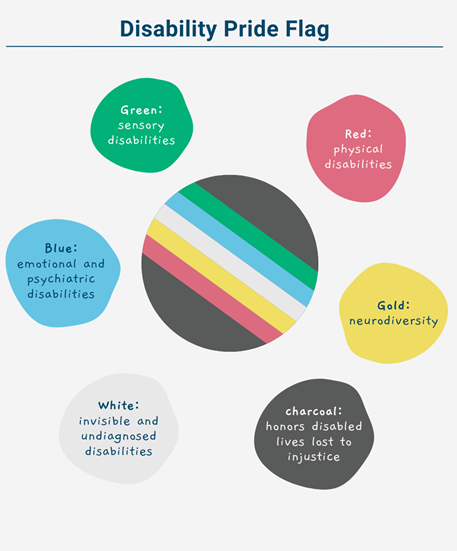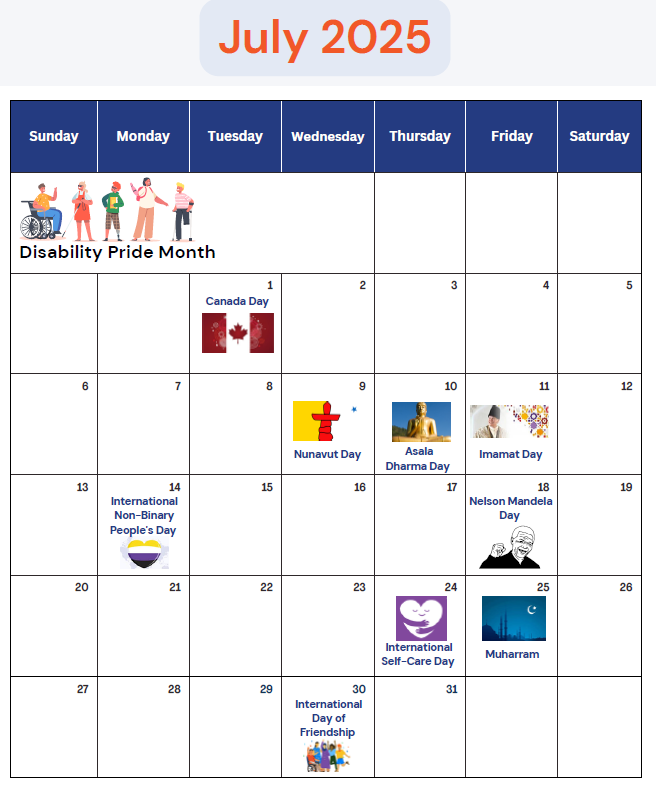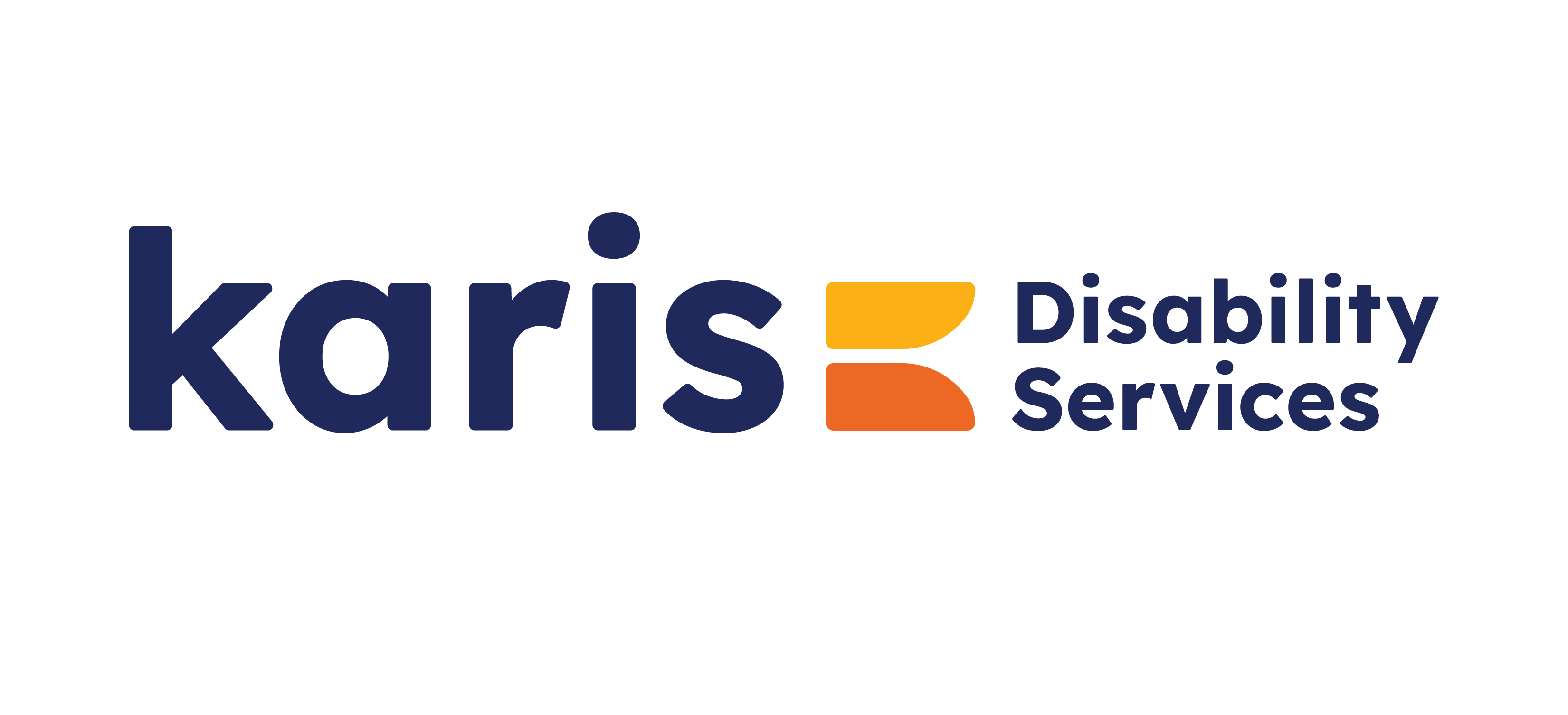June 26, 2025
 The July 2025 Equity, Diversity, Inclusion, and Belonging (EDIB) Calendar is here! Attached, you’ll find a carefully curated collection of significant dates that recognize the vibrant diversity within our communities. We encourage you to print and display it in communal spaces, share it with the people you support, and keep a copy handy for your own reference.
The July 2025 Equity, Diversity, Inclusion, and Belonging (EDIB) Calendar is here! Attached, you’ll find a carefully curated collection of significant dates that recognize the vibrant diversity within our communities. We encourage you to print and display it in communal spaces, share it with the people you support, and keep a copy handy for your own reference.
This calendar is more than a list of dates—it’s an invitation to engage. Each day highlighted represents an opportunity to deepen our understanding of cultural traditions, historical milestones, health awareness campaigns, and spiritual observances that shape the world around us. By acknowledging these moments, we foster meaningful conversations, inspire learning, and strengthen our commitment to inclusion.
At Karis Disability Services, Belonging isn’t just a value—it’s the heart of who we are. Our strength lies in our people: the individuals we support, our dedicated team, and the communities we create together. By recognizing diverse experiences and celebrating what makes each person unique, we build spaces where Everybody Belongs.
This month, our featured image is the Disability Pride Flag—a powerful symbol of identity and advocacy. It reminds us of the resilience, achievements, and contributions of people with disabilities, and encourages us to champion accessibility, representation, and dignity in all aspects of life.
Download the July Diversity Calendar

In July, we celebrate and remember:
- Disability Pride Month: an opportunity to honour the history, achievements, experiences, struggles and positive contributions of people with disabilities, who deserve to live full, self-determined lives, just like everyone else. The event aims to change the way people think about disability. It promotes all types of disability as a natural part of human diversity. July is Disability Pride Month because the work of Canadians with disabilities resulted in the “Accessible Canada Act” that came into force on July 11, 2019. Twenty-two per cent (6.2 million) of Canadians live with a disability, and this number is expected to rise. Canadians with disabilities are an essential and valuable part of the fabric of Canadian society; however, they face barriers in employment, housing, provision of services, bodily autonomy and reproductive rights, as well as other issues related to poverty and discrimination. These barriers can be worsened when combined with discrimination on the basis of intersecting identities such as race, gender, indigeneity, or age. Disability is not only an identity, but also a community with a diverse culture all their own to be proud of and celebrated. Disability culture is about visibility and self-value. Disability Pride Month is a time for recognizing these facts and listening to people with disabilities.
- Canada Day on July 1: a day commemorating the enactment of the Constitution Act in 1867 thereby establishing Canada as a new federation with its own constitution. Get caught up in the excitement and energy of the Canada Day celebrations. Whether with family or friends, take part in free events that showcase our country’s diversity, music and culture, including fireworks, parades, barbecues, concerts, carnivals, fairs, picnics, etc.
- Nunavut Day on July 9: a day to commemorate the passing of the Nunavut Land Claims Agreement Act and the Nunavut Act in 1993. It is a holiday in recognition of Nunavut’s history and traditions.
- Asala / Dharma Day on July 10: this celebration is considered a time to reflect on the scriptures and express gratitude for the Buddha’s teachings.
- Imamat Day on July 11: also known as Khushali, is celebrated to mark the anniversary of the day that the present Ismaili Muslim’s Imam (spiritual leader), succeeded his predecessor to become the Imam of the Time.
- International Non-Binary People’s Day on July 14: recognized around the world, this occasion shines a light on non-binary people (who do not identify exclusively as a man or as a woman), and celebrates the rich diversity of the community.
- Nelson Mandela Day on July 18: declared by the UN, a day to honour the legacy of Nelson Mandela and his values, through volunteering and community service, to fight poverty and promote peace, reconciliation, and cultural diversity.
- International Self-Care Day on July 24: raising awareness of the important role self-care plays in the health of Canadians and the sustainability of the health care system. The Seven Pillars of Self-Care are: Health Literacy, Mental Well-Being, Physical Activity, Healthy Eating, Risk Avoidance, Good Hygiene, Optimal Use of Products and Services. In particular, Health Literacy, is a significant factor in health care disparity and equity.
- Muharram on July 25: the start of the New Islamic Year and a time of mourning and peace. It is also one of the four sacred months of the year where good deeds are multiplied, and warfare is forbidden.
- International Day of Friendship on July 30: proclaimed in 2011 by the UN General Assembly, with the idea that friendship between peoples, countries, cultures and individuals can inspire peace efforts and build bridges between communities. Our world faces many challenges, crises and forces of division — such as poverty, violence, and human rights abuses — among many others — that undermine peace, security, development and social harmony. To confront those crises and challenges, their root causes must be addressed by promoting and defending a shared spirit of human solidarity that takes many forms — the simplest of which is friendship. By accumulating bonds of camaraderie and developing strong ties of trust, we can contribute to the fundamental shifts that are urgently needed to achieve lasting stability, weave a safety net that will protect us all, and generate passion for a better world where all are united for the greater good.
Thank you for being part of this journey. Your commitment to equity and belonging makes a difference—today and every day!
Catalina Hernandez, on behalf of Karis Disability Services Equity, Diversity, Inclusion, and Belonging working group
